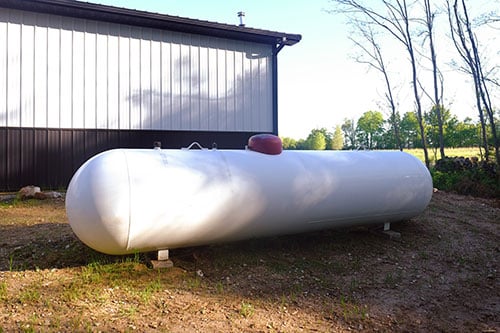Propane Vs. Natural Gas in Missouri

What is the difference between using propane or natural gas to heat your Missouri home?
While natural gas is the leading home heating source in many parts of the country, most people don’t realize that many of the benefits of natural gas translate to propane as well.
Both propane and natural gas are products of North America, primarily the U.S. shale drilling regions. Their chemical content is similar, each made up of carbon (C) and hydrogen (H) atoms. Propane’s composition is C3H8 while natural gas is CH4. Each is a low-carbon fuel that burns cleanly due to the high percentage of hydrogen in the molecule and both are considered environmentally friendly fuels.
However, propane provides about twice as much heat per unit as natural gas. One cubic foot of propane contains 2516 British Thermal Units (BTUs) while one cubic foot of natural gas contains 1030 BTU. This makes a considerable difference when an appliance is running. For example, in one hour, a 100,000 BTU/hr furnace will use about 40 cubic feet of propane. A similar natural gas furnace will consume 97 cubic feet of natural gas.
The propane lifestyle offers many benefits to homeowners. Appliances that are powered by propane are often more energy-efficient, perform better and provide a higher standard of living than electric appliances. Propane water heaters and furnaces can be paired to warm the home and provide ample hot water, even in the coldest winter months. Other appliances such as propane-powered cookstoves, dryers and fireplaces allow for maximum comfort, efficiency and convenience.
Whether it’s a super-efficient furnace, unlimited hot water, temperature-precise cooking stoves or reliable backup home generators, you can count on all of these benefits in your propane-powered home in the same way people do in homes supplied with natural gas.
Why Propane Over Natural Gas?
Independent and Reliable
Surveys have shown that people like heating their home and water with propane because they know they will have a reliable supply of propane on hand whenever they need it in their on-site propane tanks. Natural gas which is only available in limited areas and must be piped in from an outside provider, which can limit its availability to homes in rural and suburban areas. Propane users are energy independent and secure, free from disruptions in infrastructure or curtailment - when the utility limits gas consumption due to low supplies or line pressure.
Plentiful On-Site Supply
Your propane supplier has several ways to ensure that you will always have plenty of clean, dependable propane on hand, even during the coldest months, by offering keep-full, pre-buy or other plans to suit your needs. Unlike natural gas or electricity, propane customers can contract for and store their energy supply on-site for the ultimate security when winter hits. Other considerations include delivery and storage. Natural gas is a metered fuel, delivered in vapor form through gas lines, and the homeowner will pay a meter fee for that equipment. Propane is delivered directly to the home from an on-site tank, stored under pressure as a liquid, and will seldom have a meter charge.
Affordable and Convenient Buying Options
Freedom to choose a supplier is a big benefit for many propane users. Homeowners can choose from several local propane providers for competitive rates and service. With more than 100 companies serving the Show Me State, Missouri’s propane consumers also have many local options for price, service and terms. The competition for business helps keep a cap on costs. Meanwhile, because they are monopolies and have a guaranteed service area, natural gas providers enjoy a built-in profit in their rate structures approved by the Missouri Public Service Commission. Natural gas consumers pay not just for fuel but also that ROI, all administrative expenses and the overhead for providing service to a large area.
Strong Infrastructure
Compared to natural gas, which can be expensive to hook up, installing propane lines in new construction is easier to do and less expensive. Natural gas consumers have less reason to feel confident. That’s because most of the natural gas supply is dependent on old, undersized pipelines, which causes supply concerns during periods of cold weather and high demand. This leads to the question: Can you always count on getting natural gas piped into your home during periods of extremely cold weather?
Clean and Green Energy
Because natural gas is transported over mains and pipelines that have been in service for decades, environmental issues have also been raised about methane leaks coming from crumbling underground natural gas pipelines. (Methane is a greenhouse gas and the main component of natural gas.) In its original form, propane is not a greenhouse gas and it’s considered a “green” fuel because of its low carbon content. It’s non-toxic and will not pollute either the ground or air if released.
Transportation Safety
In terms of supply, propane has an edge over natural gas because of the way it’s processed and transported. After propane gets compressed into a liquid, all of this liquid petroleum gas (LPG) gets stored inside large tanks until your propane company delivers it to you. The propane gets released slowly and safely from the tank and goes through a valve, which is when the liquid propane turns into a gas again.
Abundant and Made in the U.S.A
All of the propane consumed in the U.S. is produced in North America. Every gallon you buy contributes to America’s energy independence. Abundant supply in the U.S. allows propane customers ample opportunity to ensure that they’ll always have enough on hand for their needs, so propane is a dependable energy source all year long.
Take the Propane Home Tour
Take a 3D virtual tour of a custom propane home in Sedalia, Missouri to experience the warmth, charm and efficiency of the home and discover all that the propane lifestyle has to offer.